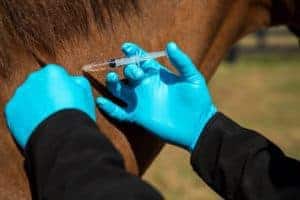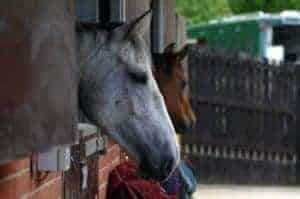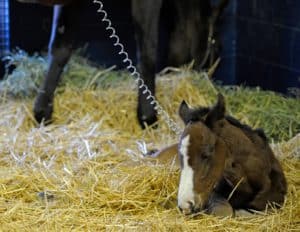
Equine Vaccination Do’s and Don’ts
Determining exactly which vaccines a horse needs can be confusing. Here are some basic do’s and don’ts to make sure you’re providing the disease protection your horse needs.

Determining exactly which vaccines a horse needs can be confusing. Here are some basic do’s and don’ts to make sure you’re providing the disease protection your horse needs.

The American Association of Equine Practitioners has published guidelines about leptospirosis risk factors, transmission, clinical signs, treatment, and other considerations.

If your horse survives one of these five infections, he might still suffer lasting effects. Learn which diseases most commonly cause post-infection illnesses and how they can impact a horse’s long-term health, use, and quality of life.

The guidelines make new recommendations for core and risk-based vaccines for horses. The committee further emphasizes that routine vaccinations are considered essential during the COVID-19 pandemic.

Intraocular gentamicin injections might be less costly and less invasive alternatives to vitrectomy in horses with early stage ERU, also known as “moon blindness.”

Reported diseases included African horse sickness, atypical myopathy, contagious equine metritis, salmonellosis, and more.

Learn about colic, EPM, core vaccinations, biosecurity, donkeys, and more in our special features.
Officials confirmed cases of equine influenza, EHV, equine infectious anemia, and other equine infectious disease outbreaks.

Use this four-step plan to keep equine infectious diseases in check.

A veterinarian can help determine risk factors in your area, the best time for vaccination, and what is right for each individual animal.

If foals are diagnosed and treated early they generally have a fair to good chance to make a full recovery.

Leptospirosis is a costly disease that can cause problems such as abortion, premature birth, and more in horses.

Leptospirosis bacteria can be present in apparently healthy horses, yet can also cause abortions and eye problems.

Learn whether your horse is at risk and if you should be vaccinating for this “new” disease.
Equine recurrent uveitis, or ERU, is the most common cause of blindness in horses worldwide. Here’s what to remember.

Is the leptospirosis vaccine for swine and cattle safe for equine use?
Stay on top of the most recent Horse Health news with
© 2022 Copyright Statement dolor sit amet, consetetur sadipscing User Terms, sed diam nonumy eirmod tempor invidunt ut labore et dolore magna aliquyam erat, sed diam voluptua. At vero eos et accusam et justo duo dolores et ea rebum. Stet clita kasd gubergren, no sea takimata sanctus est Lorem ipsum dolor sit amet.
"*" indicates required fields